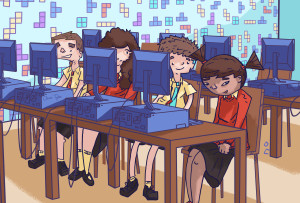23 Feb Why the best teachers love mistakes
As educators we’re passionate about inspiring and empowering our students. In fact, helping children understand more about our world is an incredibly rewarding career. But often, the most rewarding elements are not around the transfer of facts and methods of how things are done; they are in bringing the best out of students; in helping them overcome challenges and have a positive outlook on life. There is an array of people skills, characteristics and traits that will help children develop into happy, successful adults. These traits not only aid academic achievement but are, arguably, even more important.
Every week, it seems, we’re hearing stories about employers interviewing dozens of graduates with fantastic degrees and A-levels but too few with sufficient people skills and knowledge of the world outside academia to succeed in the role. In my opinion, the very best way to develop these valuable skills is to make lots of mistakes without being chastised or punished for them – they simply teach us so much about the world and ourselves. That’s why the best teachers embrace them.
Kids make mistakes: and that’s great!
1. The first defining feature of a mistake is that to make one, you’ve had to try something out*
We love people who give things a go, try new things and hopefully try their best. There’s nothing more frustrating than trying to work with a student who is talented and intelligent but who doesn’t try hard. Far more rewarding is helping children with low confidence and, perhaps, low ability give something a go even though they might get it wrong.
As soon as we act upon our thoughts and ideas, we have the ability to change things and make things happen. Proactivity and productivity are crucial in virtually all walks of life. Having the confidence to do something even though you might make a mistake is an excellent trait to possess.

Code-it Cody makes plenty of mistakes on his way to making “Hunter Lion”
*unless the mistake was not doing anything, in which case that’s a very different problem!
2. You’re most likely to make a mistake when you’re doing something new
Humans are creatures of habit and we like familiarity; we’re in our comfort zone. The truth is that our greatest achievements are usually doing things we’ve never done before or even things most people or humanity hasn’t done before. Much of what we teach in schools is very structured and there are set frameworks for completing tasks. This is never more apparent than in a maths lesson, for example, but it still holds true in subjects like English because we need to be able to score and compare children’s ability as well as teachers’ and the school’s.
Having a child use their own creativity to try and find a solution to a problem in maths and science, not just traditionally in English and art & design, should be encouraged as much as possible – they will quickly learn if what they are doing is not the best way to do it!
Remember, the greatest discoveries in maths and science have come from those who have thought outside the box about certain problems and explored their ideas; ready and willing to learn from their mistakes.
3. We learn so much from our mistakes
…and not just how not to do something! Understanding why we made a mistake and what we need to change in order to create a different outcome next time is a process which is absolutely invaluable in the real world. Developing the mindset of finding solutions to problems and overcoming challenges is important in the world of academia, employment and self-employment. It is this resilience, resourcefulness and innovative behaviour that our society, let alone employers and teachers, are looking for in the next generation of doctors, lawyers, entrepreneurs, managers, construction workers, engineers and programmers.
Most careers require subjective analysis and action rather than just knowledge of a certain field. We can always gain more knowledge by reading or taking classes; even by watching YouTube. But the really important traits in life; being able to communicate, work in a team, create new things and ultimately positively influence people and situations are not learnt so easily. They are best developed over our formative years which is why it is paramount that out schooling is full of the real life lessons, not just knowledge transfer.
The best teachers don’t mind mistakes
In fact, creating an environment where children are encouraged to make mistakes will play a key role in a teacher’s ability to teach enterprise and schools being able to develop a culture of entrepreneurship.
In letting children live and learn by making their own mistakes we teach them how they can shape their own destiny. It’s far more useful than being spoon-fed both the way things “should be done” and, ultimately, the right answer. In my experience, celebrating mistakes, in the right way, and channeling the lessons learned is truly the best way to develop happy, productive and successful people.




